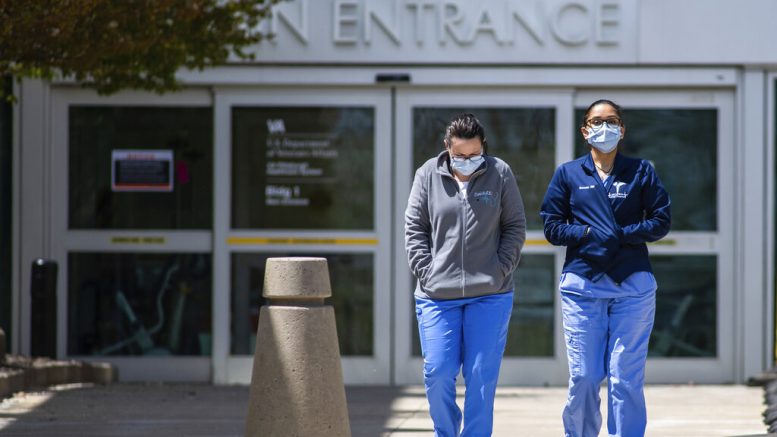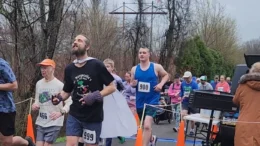HARRISBURG (AP) — Gov. Tom Wolf’s administration plans to announce Friday which parts of Pennsylvania will begin seeing a step-by-step relaxation of coronavirus-related shutdown directives, although Wolf and administration officials did not project Tuesday when the state will secure widespread mass-testing capacity.
Meanwhile, one of the state’s hardest-hit areas, southeastern Pennsylvania, appears to be past its peak rate of increase in new coronavirus cases, Wolf’s secretary of health said, as the rate has slowed in recent days in many parts of Pennsylvania.
Wolf, in a telephone news conference, didn’t estimate how long it will take to reach mass-testing capacity, and said his administration is working different “avenues” try to secure that capacity.
His administration doesn’t have a “benchmark for where we need to be,” although widespread testing is of paramount importance as long as a vaccine is a long ways off, he said.
“I believe that there’s a pretty broad agreement that testing is going to be at the heart of whatever it is we do, anybody does, to make people feel comfortable and safe and confident that they can go back to whatever it was that they want to do,” Wolf told reporters.
On Friday, the administration will announce which regions or counties can see some relief from shutdown orders by moving from a “red” designation to a “yellow” designation, Secretary of Health Rachel Levine said.
Those changes would take effect the following Friday, May 8, a previously announced date. Amid growing complaints from some parts of the state, Levine and Wolf both said Tuesday that a county’s designation is not necessarily tied to a wider region’s.
Friday’s announcement will come with a benchmark for testing “that we’ll be shooting for,” Levine said. “It will be aspirational, that we would like to get to this much testing in those areas.”
Under yellow, a ban on gatherings of over 25 people will remain, and gyms, casinos, theaters and other indoor recreational, wellness and entertainment venues will stay closed. Restaurants and bars will still be limited to carry-out or delivery, and businesses must follow federal and state guidance for social distancing and cleaning.
In the meantime, even testing every prison inmate and every nursing home resident and employees — places particularly vulnerable to outbreaks — is beyond the state’s ability, Levine said.
Pennsylvania has been dogged by shortages of testing materials like swabs and reagents, Wolf has said.
In other coronavirus-related developments in Pennsylvania:
SCHOOL FINANCES
Pennsylvania’s 500 school districts are facing a projected loss of as much as 5% in the revenue from local taxes as the coronavirus pandemic shutdowns take a heavy toll on the economy, a leading public schools group said Tuesday.
The Pennsylvania Association of School Business Officers said it is projecting a loss of $1 billion, or 5%, in revenue from local school taxes if economic recovery lags. A quicker turnaround could limit the damage to a loss of $850 million, or 4%, the group said.
School districts reported spending about $30 billion in the 2017-2018 school year, according to state data, the latest available for that statistic.
About $17.5 billion in revenue that year came from local sources, primarily property taxes, and $11.5 billion came from the state, according to the data.
Meanwhile, a massive deficit facing state government, as well as a delayed July 15 deadline for filing taxes, is casting doubt on how much state aid schools can expect.
CASES
More than 1,200 additional cases of the coronavirus were reported in Pennsylvania on Tuesday by the state Health Department, raising the total to more than 43,200.
The agency reported 119 additional deaths, boosting the statewide total to above 1,700 deaths.
The number of infections is thought to be far higher because many people have not been tested, and studies suggest people can be infected with the virus without feeling sick. The department, however, does not have statistics on how many of those people reported to be infected have since had a full recovery.
Most hospitalizations and deaths have occurred in patients 65 or older, officials said. The disease has spread to every county in the state.
For most people, the virus causes mild or moderate symptoms that clear up in a couple of weeks. Older adults and people with existing health problems are at higher risk of more severe illness, including pneumonia, or death.
DELAYING COMMUTATIONS
Lt. Gov. John Fetterman, who chairs the state Board of Pardons, said he will indefinitely delay a June consideration of dozens of requests for clemency from state prison inmates while the coronavirus outbreak threatens public health.
Fetterman said it was to be the largest such collection of requests to be considered at one single board meeting.
However, he said, it is impossible to hold the meeting and give each inmate due consideration, including in-person interviews, while protecting the health of the inmates and the board members.
Fetterman said work continues on cases and he hopes to reschedule the hearings within 30 days of the reopening of the Capitol Complex.
STATE COURT OPERATIONS
Pennsylvania courts are being allowed to resume many of the functions that have been suspended for more than a month in response to the COVID-19 pandemic.
The state Supreme Court said in an order issued Tuesday that starting next Monday, state courts will be open to conduct most business unless a local emergency order is in place, although in-person access to court facilities will be limited.
The justices said their order that suspended some court deadlines and time limits will end May 11. Criminal and civil jury trials won’t resume, and the court didn’t indicate when that will happen.
A statewide moratorium on evictions will also end May 11, although the high court said there may be other special federal rules for evictions during the pandemic.
The justices kept a statewide judicial emergency in place until June 1 to give local county president judges flexibility, including over court deadlines.
Lawyers are encouraged to perform depositions remotely. Depositions as well as other mandatory appearances by doctors, nurses and others in health care remain suspended until June 1.









































